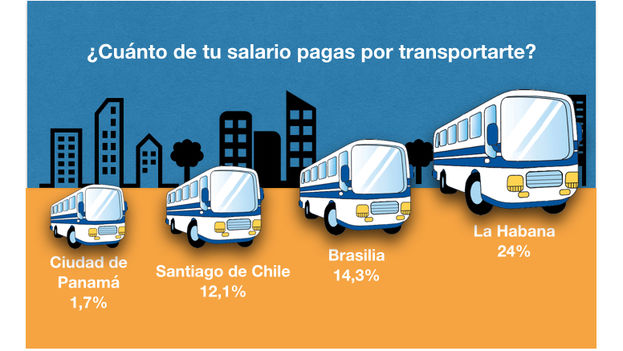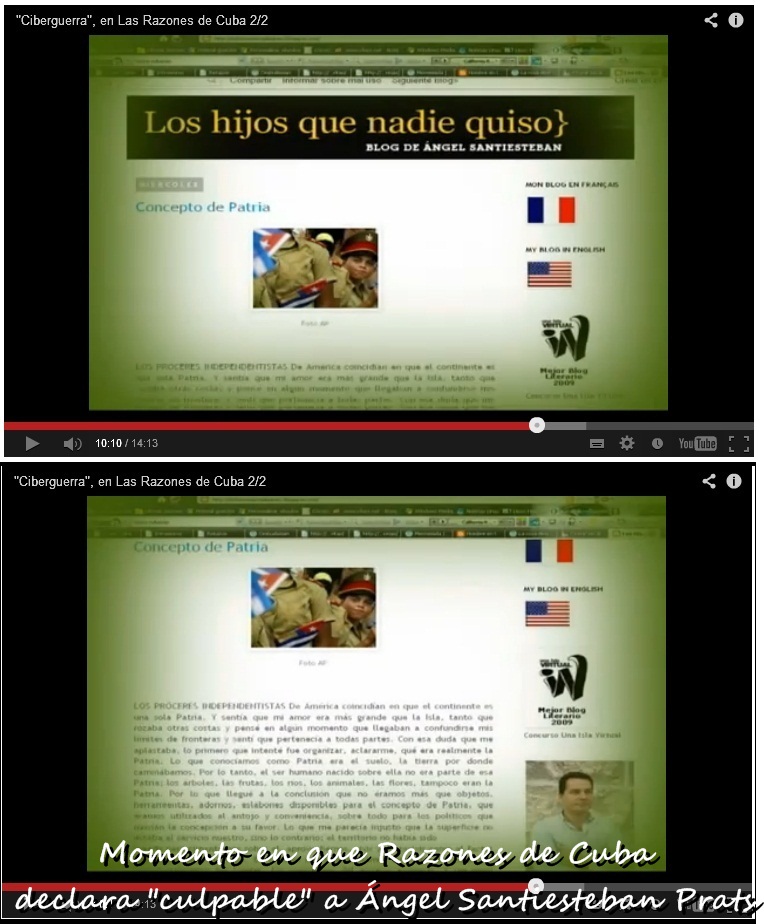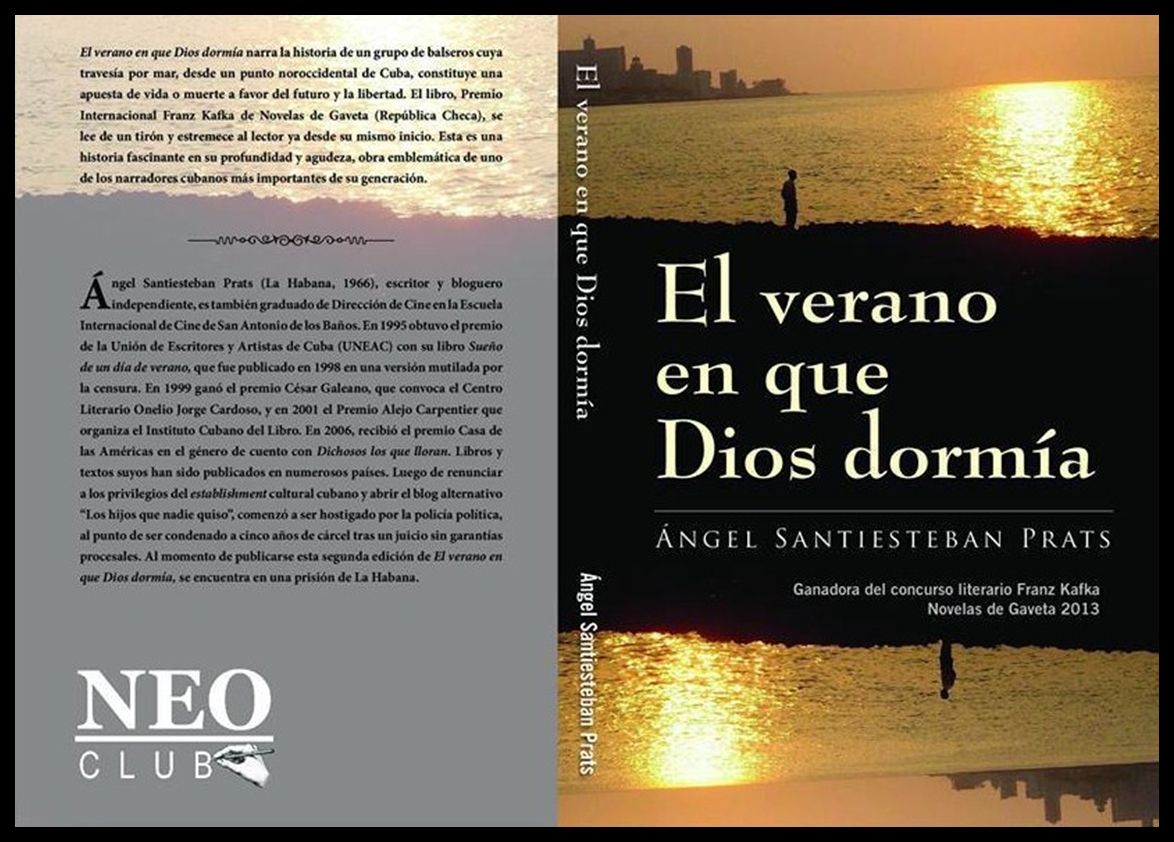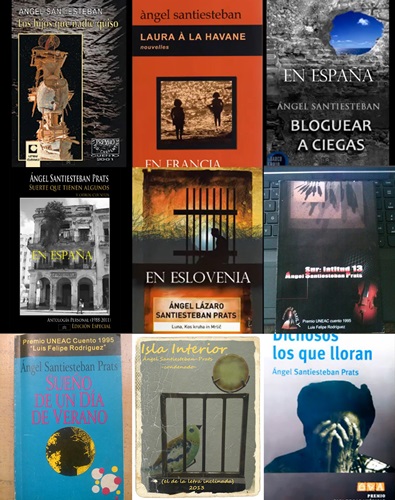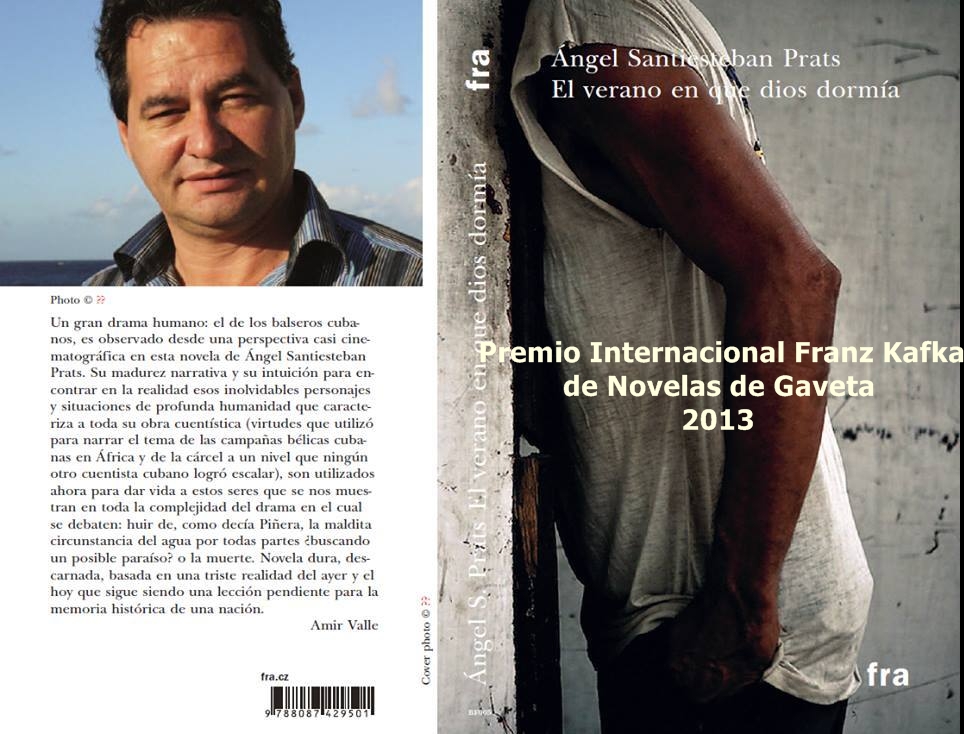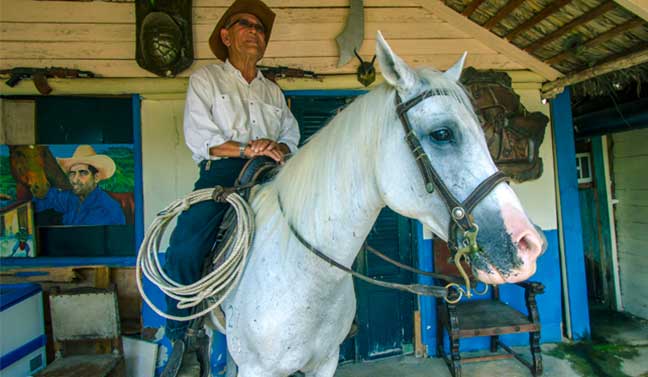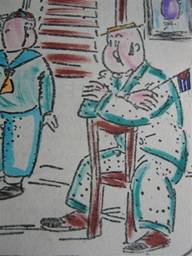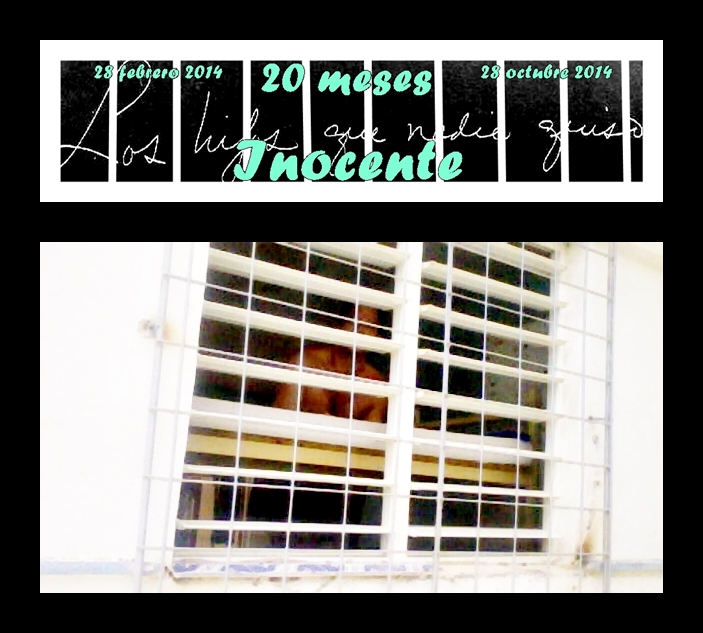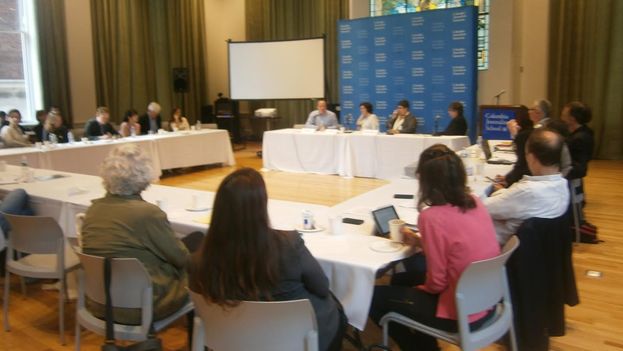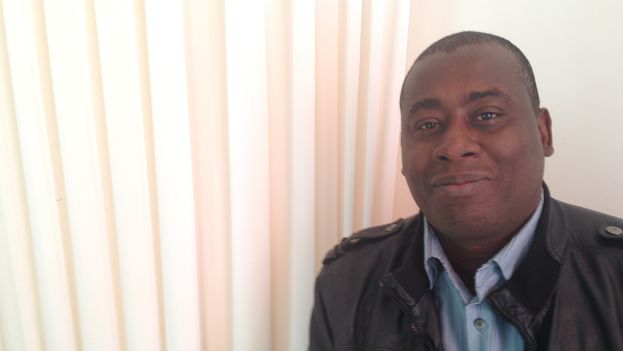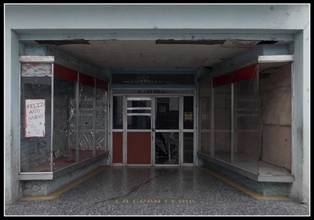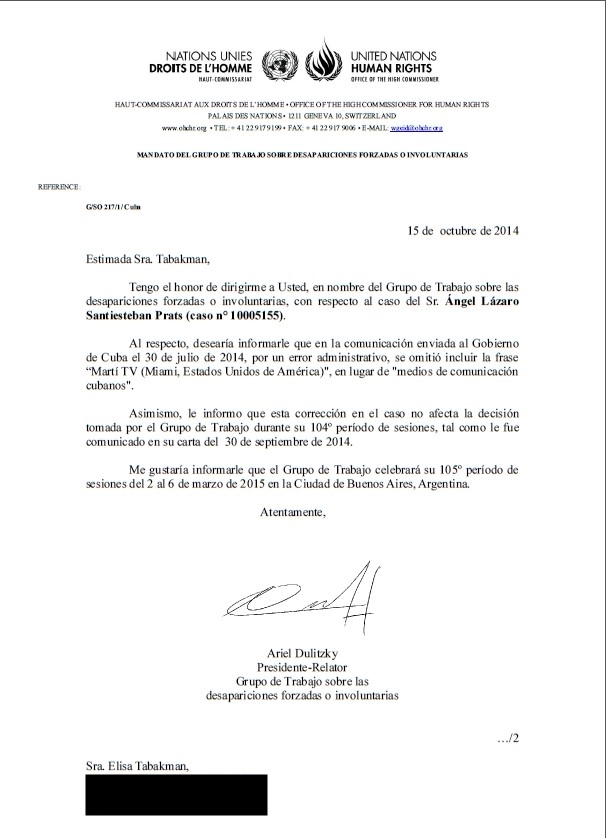During the days in which Ángel Santiesteban-Prats’ whereabouts were unknown, and with fears absolutely based on the illegal transfers that he experienced before, we filed a complaint with the United Nations Working Group on Forced or Involuntary Disappearances, so they would put it before the Regime in Havana to clarify his whereabouts.
Translation of letter from the High Commissioner’s Office of the United Nations Human Rights Commission:
Dear Mrs. Tabakman,
I have the honor of addressing you in the name of the Working Group on Forced or Involuntary Disappearances with respect to the case of Mr. Ángel Lazaro Santiesteban Prats (case no. 10005155).
In this respect I would like to inform you that the communication sent to the Government of Cuba on July 30, 2014, due to an administrative error, did not include the phrase “Marti TV (Miami, United States)” in place of “Cuban communication media.”
Furthermore, I want you to know that this correction of the case does not affect the decision taken by the Working Group during its 104th session, such as was communicated to you in its letter of September 30, 2014.
I would like to inform you that the Working Group will celebrate its 105th session between March 2-6, 2015, in the City of Buenos Aires, Argentina.
Sincerely yours,
Ariel Dulitzky, President-Presenter
They acted with the dedication and speed that an emergency requires, and, of course, the Castro dictatorship did not. They only responded to the Group’s requirement when it gave them the demand; that is, when Ángel already had been located by journalists from 14Ymedio. Thanks to them we knew where he was, although they couldn’t meet with him. The Regime had put him in the border military prison where he presently is. continue reading
I want to point out not only the fact that the Regime responded to the presenter for the Working Group, but they also took advantage of the occasion to lie blatantly and use against the “source” complainant the same strategies they use to falsely accuse and imprison the opposition. All thieves believe that others are like them.

Translation of document from Cuban government:
On the other hand, the facts transcribed are not reliable. They don’t come from pertinent and credible sources that act in good faith, in accord with the principles of cooperation in the matter of human rights and without political motivation, contrary to what is set forth in the United Nations Charter. They are supported by unfounded accusations that are only intended to tarnish the reality of Cuba’s record in the promotion and protection of all human rights for everyone.
They exploited an involuntary omission in the group’s communication to the Cuban government to try to disqualify the complaint and the complainants. Now they have just communicated and corrected the omission – again – in order to continue supporting their lies, but they will preserve the same pathetic silence that they have with respect to the whole case.
I am transcribing here the response from the Regime (the complete document is attached in a link in this post):
Session: 104
Government Item
Date: September 4, 2014
The Government of Cuba reported that:
“The allegations about a supposed transfer of the citizen Ángel Lázaro Santiesteban Prats,
from the place where he was fulfilling a punishment of deprivation of liberty to a ’military base.’
“After investigation, it was demonstrated that:
“1. At 7:00 a.m. on July 21, 2014, Santiesteban Prats tried to escape from the center where he was held as a prisoner (with open living). Immediately complaint 38563/14 was filed in the station of the National Revolutionary Police of Municipio Diez de Octubre, for the crime of Escape of Prisoners or Detainees.
“2. At 1:05 a.m. on July 27, 2014, Santiesteban Prats was detained and transferred to the Territorial Department of Criminal Investigation and Operations, where he remains. He enjoys good health and receives all the benefits established in the Cuban penitentiary system.
“3. Santiesteban Prats himself admitted that he fled from the detention center with the goal of leaving the country in an irregular and covert manner, with support from the exterior, and to thereby avoid having to continue serving his sentence.
“On the other hand, the facts transcribed are not reliable. They don’t come from pertinent and credible sources that act in good faith, in accord with the principles of cooperation in the matter of human rights and without political motivation, contrary to what is set forth in the United Nations Charter. They are supported by unfounded accusations that are only intended to tarnish the reality of Cuba’s record in the promotion and protection of all human rights for everyone.
“In that sense, it is false that his presumed disappearance was related to ’declarations of a person associated with him in Cuban communication media in the days previous to July 20, 2014.’
“Nor for his activities as a writer and blogger was Santiesteban Prats sentenced to five years in prison for having committed common crimes, as regulated in the present Cuban Penal Code.
“He was accused by his wife, Kenla Liley Rodriguez Guzmán, in August 2009, of the crimes of Harm, Home Invasion, Injuries, Threats, Rape, and Robbery with Force. After investigation, the Prosecutor presented the case before the Provincial Court of Havana for the crimes of Injuries and Home Invasion.
“From that time they knew of his intentions to flee the country in an irregular and covert manner, incited by his sister who lives in the exterior, to evade his sentence. He finally tried, unsuccessfully, in July of this year, as already has been explained.”
Ángel Santiesteban, without even knowing of the existence of the complaint or this document, has already given an answer to that nonsense in the message that was sent explaining what motivated him to leave the Lawton prison settlement and saying that he would give himself up several days later. The only certainty in everything the dictatorship alleges is that he recognized that he abandoned the prison voluntarily, taking advantage of the movement of the prisoners who left for work in the morning.
The first lie, which falls of its own weight, is that “he receives all the benefits established in the Cuban penitentiary system.” Exactly because he DOESN’T receive them is the reason he left on his own to recover them (the 15 days of pass that corresponded to the last 10 months, which they arbitrarily denied him). He wasn’t “detained” on July 27 like they allege. He gave himself up, telling the official who received him that they still owed him 10 days of pass.
“On the other hand, the facts transcribed are not reliable. They don’t come from pertinent and credible sources that act in good faith, in accord with the principles of cooperation in the matter of human rights and without political motivation, contrary to what is set forth in the United Nations Charter. They are supported by unfounded accusations that are only intended to tarnish the reality of Cuba’s record in the promotion and protection of all human rights for everyone.”
Such a declaration merits nothing more than remembering that we are facing a dictatorship where neither law nor justice exists, in which they only administer rewards and punishments according to whether one is obsequious or opposed. The cynicism of those who work for the Regime is such that they have the nerve to mention the United Nations Charter and human rights. Does Mr. Dictator finally want to ratify the pacts of the U.N.? The biggest violator of all human rights on the continent makes believe that the complaint “continues tarnishing reality and the executive of Cuba in the promotion and protection of all human rights for everyone.” Ask him about all the executions, assassinations, tortures, imprisonments, and those who have been banished and forced into exile who have endured the said promotion and protection for 55 years.
Then they relied on the before-mentioned omission to lie again: “(…) It’s false that his presumed disappearance was related to ’declarations of a person associated with him in the Cuban communication media in the days previous to July 20, 2014.’ Now it’s already been explained to them that it was a matter of an omission, clarifying that it referred to the declaration of Angel’s son in a television program from Miami. How do they explain that they had prepared a transfer for Angel and that he complained only five days after his son said on Television Marti how he had been manipulated by his mother and the political police to lie and prejudice the case against his father? Wasn’t there a relationship with the said complaints? Are they trying to delegitimize the rumor that he denounced his imminent transfer on July 20 when on August 13 they incarcerated him where he said they would? The Regime knows perfectly well that there was an involuntary omission in the report, and they knew that it referred to the declarations of Angel’s son on Television Marti, who said that the political police were permanently spying on him, so that the Human Rights Commission granted cautionary measures for him also.
Ángel Santiesteban is the only “common” prisoner to whom the dictatorship has offered – on numerous occasions since he was incarcerated – freedom and banishment in exchange for renouncing his political position, documenting it in a video. Every time he has refused outright and denounced this in his blog. Even so, they continue stubbornly trying to convince him. So that “From this time they knew about his intentions to abandon the country in an irregular and covert manner (…)” is no more than another cock-and-bull story like the ones they habitually resort to in order to justify the unjustifiable: the lack of freedoms, guarantees, and protections for the citizen victims of the island prison.
Ángel never asked that they free him; he only requested a review of the trial with ALL the guarantees of due process that they denied him when they took him to prison. If they would proceed to carry out the review, he would be absolved, because the accusations aretotally false. That’s the reason they delay the review with the stupidest excuses, because they only pretend to penalize him by keeping him locked up: “Nor for his activities as a writer and blogger was Santiesteban Prats sentenced to five years in prison for having committed common crimes, as regulated in the present Cuban Penal Code.”
The accuser is named Kenia Diley Rodríguez Guzmán; only by reading how they refer to her in the response do we have proof of the “care” they put into fabricating causes of action, the accusations and the accusers. It doesn’t ever matter to them who has lied; the only thing that matters is that their lies serve the interests of the dictatorship: “He was accused by his wife, Kenla Liley Rodriguez Guzmán, in August 2009, for the crimes of Harm, Home Invasion, Injuries, Threats, Rape, and Robbery with Force. After investigation, the Prosecutor presented the case before the Provincial Court of Havana for the crimes of Injuries and Home Invasion.”
I remember again that as there wasn’t any proof that would incriminate him, they condemned him after a report from a lieutenant, a handwriting expert, who alleged that “from the size and inclination of his handwriting, he’s guilty.”
In the end, there is little to add that is not already known.
The Editor
Translated by Regina Anavy
20 October 2014

